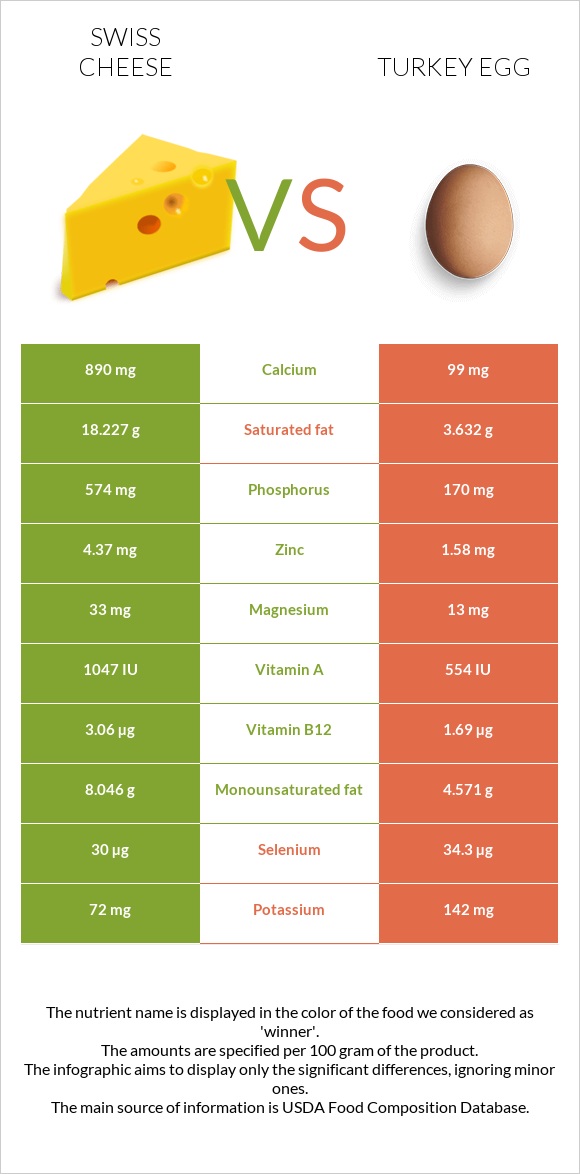Swiss cheese vs. Turkey egg — In-Depth Nutrition Comparison
Compare
Differences between Swiss cheese and turkey eggs
- Swiss cheese is higher in calcium, phosphorus, vitamin B12, and zinc; however, turkey eggs are richer in iron, vitamin B5, folate, and vitamin B2.
- Turkey eggs' daily need coverage for cholesterol is 280% higher.
- Swiss cheese has 9 times more calcium than turkey eggs. While Swiss cheese has 890mg of calcium, turkey eggs have only 99mg.
- Turkey eggs have less saturated fat.
The food types used in this comparison are Cheese, swiss and Egg, turkey, whole, fresh, raw.
Infographic

Infographic link
Mineral Comparison
Mineral comparison score is based on the number of minerals by which one or the other food is richer. The "coverage" charts below show how much of the daily needs can be covered by 300 grams of the food.
| Contains more MagnesiumMagnesium | +153.8% |
| Contains more CalciumCalcium | +799% |
| Contains more ZincZinc | +176.6% |
| Contains more PhosphorusPhosphorus | +237.6% |
| Contains more PotassiumPotassium | +97.2% |
| Contains more IronIron | +3053.8% |
| Contains more CopperCopper | +31.9% |
| Contains less SodiumSodium | -19.3% |
| Contains more ManganeseManganese | +46.2% |
| Contains more SeleniumSelenium | +14.3% |
Vitamin Comparison
Vitamin comparison score is based on the number of vitamins by which one or the other food is richer. The "coverage" charts below show how much of the daily needs can be covered by 300 grams of the food.
| Contains more Vitamin AVitamin A | +73.5% |
| Contains more Vitamin EVitamin E | +∞% |
| Contains more Vitamin B3Vitamin B3 | +166.7% |
| Contains more Vitamin B12Vitamin B12 | +81.1% |
| Contains more Vitamin KVitamin K | +∞% |
| Contains more Vitamin B1Vitamin B1 | +900% |
| Contains more Vitamin B2Vitamin B2 | +55.6% |
| Contains more Vitamin B5Vitamin B5 | +435.1% |
| Contains more Vitamin B6Vitamin B6 | +84.5% |
| Contains more FolateFolate | +610% |
All nutrients comparison - raw data values
| Nutrient |  |
 |
DV% diff. |
| Cholesterol | 93mg | 933mg | 280% |
| Calcium | 890mg | 99mg | 79% |
| Saturated fat | 18.227g | 3.632g | 66% |
| Phosphorus | 574mg | 170mg | 58% |
| Vitamin B12 | 3.06µg | 1.69µg | 57% |
| Iron | 0.13mg | 4.1mg | 50% |
| Vitamin B5 | 0.353mg | 1.889mg | 31% |
| Fats | 30.99g | 11.88g | 29% |
| Protein | 26.96g | 13.68g | 27% |
| Zinc | 4.37mg | 1.58mg | 25% |
| Folate | 10µg | 71µg | 15% |
| Vitamin A | 288µg | 166µg | 14% |
| Vitamin B2 | 0.302mg | 0.47mg | 13% |
| Calories | 393kcal | 171kcal | 11% |
| Monounsaturated fat | 8.046g | 4.571g | 9% |
| Selenium | 30µg | 34.3µg | 8% |
| Vitamin B1 | 0.011mg | 0.11mg | 8% |
| Magnesium | 33mg | 13mg | 5% |
| Vitamin B6 | 0.071mg | 0.131mg | 5% |
| Vitamin E | 0.6mg | 4% | |
| Choline | 15.5mg | 3% | |
| Potassium | 72mg | 142mg | 2% |
| Copper | 0.047mg | 0.062mg | 2% |
| Sodium | 187mg | 151mg | 2% |
| Polyunsaturated fat | 1.341g | 1.658g | 2% |
| Manganese | 0.026mg | 0.038mg | 1% |
| Vitamin K | 1.4µg | 1% | |
| Net carbs | 1.44g | 1.15g | N/A |
| Carbs | 1.44g | 1.15g | 0% |
| Vitamin B3 | 0.064mg | 0.024mg | 0% |
| Trans fat | 0.987g | N/A | |
| Tryptophan | 0.401mg | 0.219mg | 0% |
| Threonine | 1.038mg | 0.672mg | 0% |
| Isoleucine | 1.537mg | 0.855mg | 0% |
| Leucine | 2.959mg | 1.201mg | 0% |
| Lysine | 2.585mg | 0.924mg | 0% |
| Methionine | 0.784mg | 0.442mg | 0% |
| Phenylalanine | 1.662mg | 0.773mg | 0% |
| Valine | 2.139mg | 0.985mg | 0% |
| Histidine | 1.065mg | 0.33mg | 0% |
| Omega-3 - ALA | 0.125g | N/A | |
| Omega-3 - DPA | 0.018g | N/A | |
| Omega-3 - Eicosatrienoic acid | 0.003g | N/A | |
| Omega-6 - Gamma-linoleic acid | 0.002g | N/A | |
| Omega-6 - Dihomo-gamma-linoleic acid | 0.032g | N/A | |
| Omega-6 - Eicosadienoic acid | 0.007g | N/A | |
| Omega-6 - Linoleic acid | 0.734g | N/A |
Macronutrient Comparison
Macronutrient breakdown side-by-side comparison
Protein:
26.96 g
Fats:
30.99 g
Carbs:
1.44 g
Water:
37.63 g
Other:
2.98 g
Protein:
13.68 g
Fats:
11.88 g
Carbs:
1.15 g
Water:
72.5 g
Other:
0.79 g
| Contains more ProteinProtein | +97.1% |
| Contains more FatsFats | +160.9% |
| Contains more CarbsCarbs | +25.2% |
| Contains more OtherOther | +277.2% |
| Contains more WaterWater | +92.7% |
Fat Type Comparison
Fat type breakdown side-by-side comparison
Saturated fat:
Sat. Fat
18.227 g
Monounsaturated fat:
Mono. Fat
8.046 g
Polyunsaturated fat:
Poly. Fat
1.341 g
Saturated fat:
Sat. Fat
3.632 g
Monounsaturated fat:
Mono. Fat
4.571 g
Polyunsaturated fat:
Poly. Fat
1.658 g
| Contains more Mono. FatMonounsaturated fat | +76% |
| Contains less Sat. FatSaturated fat | -80.1% |
| Contains more Poly. FatPolyunsaturated fat | +23.6% |





